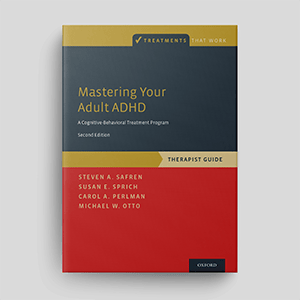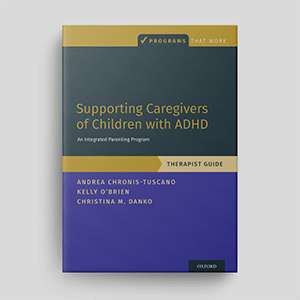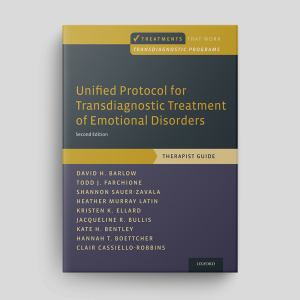Mastering Your Adult ADHD: A Cognitive-Behavioral Treatment Program (Second Edition): Workbook
The Mastering Your Adult ADHD program provides step-by-step instructions and evidence-based strategies for supporting adults with attention-deficit/hyperactivity disorder (ADHD). A therapist guide is downloadable separately.
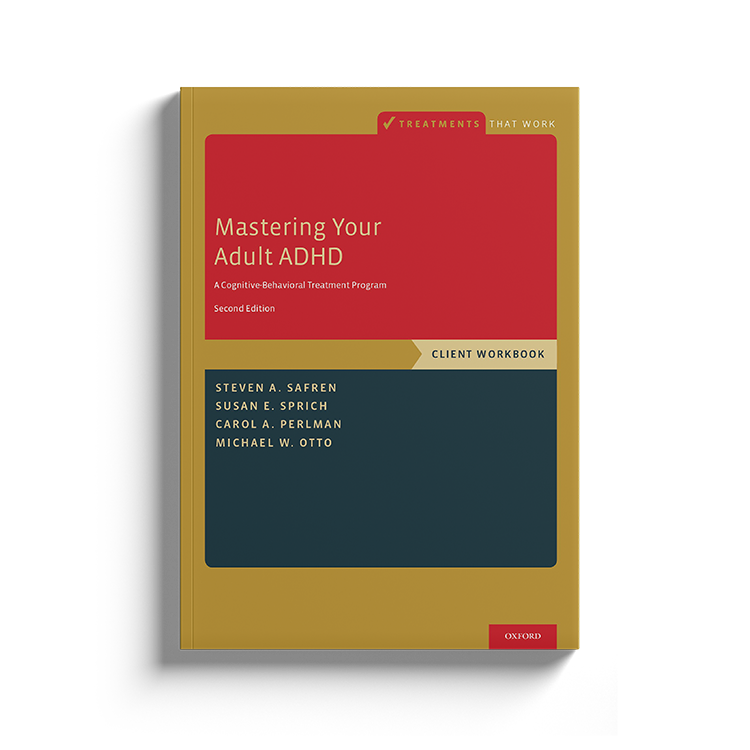
Download or send
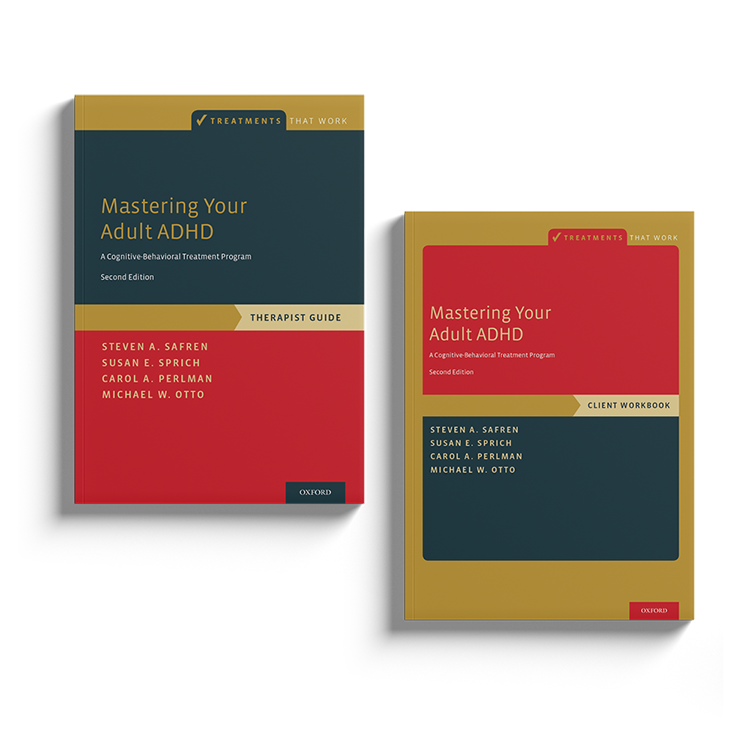
Overview
Mastering Your Adult ADHD: A Cognitive-Behavioral Treatment Program offers a comprehensive guide for therapists to help clients overcome the unique challenges of adult ADHD. While medications can alleviate core symptoms like inattention and impulsivity, many adults continue to face significant difficulties in areas such as organization, time management, and emotional regulation. This evidence-based cognitive-behavioral therapy (CBT) program provides practical tools and strategies to complement medication, empowering clients to build lasting improvements in both personal and professional domains. Developed at Massachusetts General Hospital / Harvard Medical School (MGH / Harvard) and backed by rigorous clinical research, this treatment program combines cognitive and behavioural techniques to address the real-world impairments of ADHD. With refinements based on patient feedback and tailored sessions for family involvement, the guide delivers a proven, holistic pathway to success for adults navigating the complexities of ADHD.
Why use this resource?
This program provides a step-by-step, structured approach for addressing challenges associated with ADHD. It includes:
- Detailed explanations of cognitive-behavioral principles tailored to ADHD.
- Effective interventions for managing difficulties associated with ADHD such as procrastination.
- Practical guidance for structuring sessions and implementing client exercises.
- Strategies for overcoming common obstacles during treatment.
Key benefits
Structured
Educational
Effective
Trusted
What difficulties is this for?
Attention-Deficit/Hyperactivity Disorder (ADHD)
Difficulties with attention, impulsivity, and executive functioning in adulthood.
Integrating it into your practice
Assessment
Explore how clients experience ADHD.
Identification
Identify specific challenges associated with ADHD.
Skills
Implement effective cognitive-behavioral interventions to address relevant difficulties.
Monitoring
Use structured worksheets to track progress and refine interventions.
Relapse Prevention
Equip clients with long-term strategies for maintaining their progress.
Theoretical background and therapist guidance
ADHD is a well-established neurobiological disorder that is validly and reliably diagnosed in both childhood and adulthood (Agarwal, Goldenberg, Perry, & Ishak, 2012; Barkley, Murphy, & Fischer, 2008). Adult ADHD is associated with significant impairments in employment, education, and social functioning, with core symptoms such as inattention, impulsivity, and poor self-regulation leading to challenges in organization, time management, and interpersonal relationships (Biederman et al., 1996; Barkley, 1998). These difficulties often result in underachievement, financial struggles, and chaotic routines. Additionally, adults with ADHD have higher risks of substance abuse and engagement in risky behaviors, including unsafe driving and impulsive decision-making (Barkley, Murphy, & Fischer, 2008).
This program integrates CBT with medication, offering a comprehensive approach to managing adult ADHD. It targets unhelpful thoughts, such as “I can’t do this,” and maladaptive behaviors, like avoiding tasks or neglecting organizational systems, through structured skills training. Clients practice these strategies at home to ensure lasting changes (Safren et al., 2005; Safren et al., 2010b). The program has been refined to address real-world challenges, including managing household tasks and family dynamics, reflecting its adaptability and practical focus. By bridging the gaps left by medication, this holistic approach provides clients with the tools they need to navigate relationships, employment, and daily life more effectively (Wilens et al., 1999).
This program was developed and initially tested at Massachusetts General Hospital / Harvard Medical School’s Department of Psychiatry with input from leading experts in adult ADHD, including Drs. Joseph Biederman, Timothy Wilens, and Thomas Spencer. Early research demonstrated the efficacy of this intervention through a randomized controlled trial comparing CBT combined with medication to medication alone. Adults who received CBT showed significant reductions in ADHD severity as assessed by independent evaluators, alongside improvements in associated symptoms of anxiety and depression. Importantly, these gains remained significant even when controlling for baseline levels of depression, and there were significantly more responders in the CBT group than in the medication-alone group (Safren et al., 2005). These results support the feasibility and efficacy of CBT as a next-step treatment for adults with residual ADHD symptoms.
Subsequent research refined the treatment protocol and expanded upon the initial findings. A five-year full-scale efficacy study funded by the National Institute of Mental Health compared CBT to a relaxation-plus-educational-support control intervention, both delivered alongside medication. Participants receiving CBT demonstrated superior outcomes on core ADHD measures, including the Clinical Global Impression scale and ADHD rating scale, as well as higher response rates. Notably, these gains were maintained at six- and 12-month follow-ups, underscoring the durability of the treatment effects (Safren et al., 2010b). The findings were published in The Journal of the American Medical Association, a prestigious medical journal that rarely features psychosocial intervention trials, highlighting the significance of the results.
Authored by leading psychologists including David Barlow, Michelle Craske and Edna Foa, Treatments That Work™ is a series of manuals and workbooks based on the principles of cognitive behavioral therapy (CBT). Each pair of books (Therapist/Clinician Guide and Workbook) – contains step-by-step procedures for delivering evidence-based psychological interventions and will help you provide the best possible care for your clients.
At Psychology Tools, we are proud to make many of the Treatments That Work™ titles available to our members. Each book is available to download chapter-by-chapter, and Psychology Tools members with a currently active subscription to our ‘Complete’ plan are licensed to share copies with their clients.
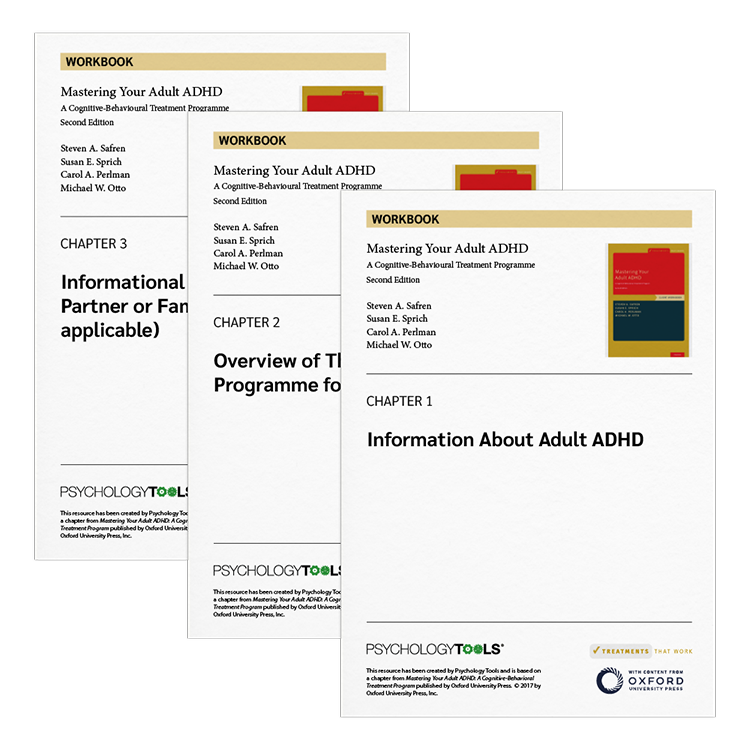
What's inside
- Structured modules covering organization, attention management, and cognitive restructuring
- Worksheets and exercises for tracking progress and building new habits
- Practical strategies for reducing procrastination and improving task follow-through
- Tools for managing emotional responses and adaptive thinking
FAQs
How this resource helps improve clinical outcomes
By incorporating Mastering Your Adult ADHD into therapy, clinicians can support clients in:
- Developing structure by improving time management and task completion.
- Enhancing self-regulation by reducing impulsive behaviors and emotional reactivity.
- Building self-awareness by increasing insight into cognitive and behavioral patterns.
- Fostering resilience by strengthening adaptive coping mechanisms.
Therapists benefit from a structured framework that supports individualized treatment while ensuring evidence-based strategies are consistently applied.
Clinicians who use this resource also use
References and further reading
- Agarwal, R., Goldenberg, M., Perry, R., & Ishak, W. W. (2012). The quality of life of adults with attention deficit hyperactivity disorder: A systematic review. Innovations in Clinical Neuroscience, 9(5-6), 10-21.
- Barkley, R. A. (1998). Attention-deficit hyperactivity disorder: A handbook for diagnosis and treatment (2nd ed.). New York: Guilford Press.
- Barkley, R. A., Murphy, K. R., & Fischer, M. (2008). ADHD in adults: What the science says. New York: Guilford Press.
- Biederman, J., Wilens, T. E., Spencer, T. J., Faraone, S. V., Mick, E., Ablon, J. S., & Keily, K. (1996). Diagnosis and treatment of adult attention-deficit/hyperactivity disorder. In M. H. Pollack, M. W. Otto, & J. F. Rosenbaum (Eds.), Challenges in clinical practice (pp. 380-407). New York: Guilford Press.
- Faraone, S. V., & Glatt, S. J. (2010). A comparison of the efficacy of medications for adult attention-deficit/hyperactivity disorder using meta-analysis of effect sizes. Journal of Clinical Psychiatry, 71(6), 754-763.
- Safren, S. A., Otto, M. W., Sprich, S., Perlman, C. L., Wilens, T. E., & Biederman, J. (2005). Cognitive behavioral therapy for ADHD in medication-treated adults with continued symptoms. Behaviour Research and Therapy, 43(7), 831-842.
- Safren, S. A., Sprich, S., Mimiaga, M. J., Surman, C., Knouse, L., Groves, M., & Otto, M. W. (2010b). Cognitive behavioral therapy vs. relaxation with educational support for medication-treated adults with ADHD and persistent symptoms: A randomized controlled trial. JAMA, 304(8), 875-880.
- Wilens, T. E., Spencer, T. J., & Biederman, J. (1998b). Pharmacotherapy of adult ADHD. In R. A. Barkley (Ed.), Attention deficit hyperactivity disorder: A handbook for diagnosis and treatment (2nd ed., pp. 592-606). New York: Guilford Press.
- Wilens, T. E., Spencer, T. J., & Biederman, J. (2002a). A review of the pharmacotherapy of adults with attention-deficit/hyperactivity disorder. Journal of Attention Disorders, 5(4), 189-202.
- Wilens, T., McDermott, S. P., Biederman, J., Abrantes, A., Hahesy, A., & Spencer, T. J. (1999). Cognitive therapy in the treatment of adults with ADHD: A systematic chart review of 26 cases. Journal of Cognitive Psychotherapy, 13(3), 215-227.
Just enter your name and email address, and we'll send you Mastering Your Adult ADHD: A Cognitive-Behavioral Treatment Program (Second Edition): Workbook (English US) straight to your inbox. You'll also receive occasional product update emails wth evidence-based tools, clinical resources, and the latest psychological research.
Product
Company
Support
- © 2026 Psychology Tools. All rights reserved
- Terms & Conditions
- Privacy Policy
- Cookies Policy
- Disclaimer
Working...
We value your privacy
This site uses strictly necessary cookies to function. We do not use cookies for analytics, marketing, or tracking purposes. By clicking “OK”, you agree to the use of these essential cookies. Read our Cookie Policy
